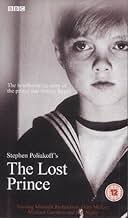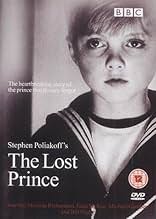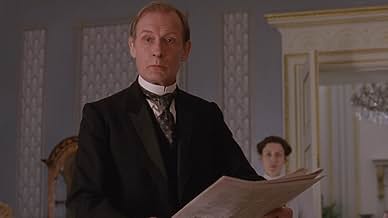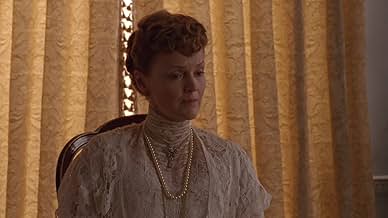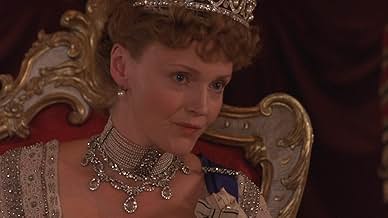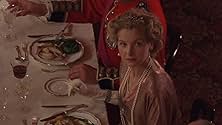IMDb RATING
7.6/10
2.2K
YOUR RATING
The story of Prince John, the autistic and epileptic youngest son of Queen Mary and King George V, who spent his whole life hidden away from public view and died at the age of 13 in 1919.The story of Prince John, the autistic and epileptic youngest son of Queen Mary and King George V, who spent his whole life hidden away from public view and died at the age of 13 in 1919.The story of Prince John, the autistic and epileptic youngest son of Queen Mary and King George V, who spent his whole life hidden away from public view and died at the age of 13 in 1919.
- Won 3 Primetime Emmys
- 8 wins & 21 nominations total
Storyline
Did you know
- TriviaKing George V had six children, two of whom used the name George. His second son was Prince Albert Frederick Arthur George, known to the family as Bertie, who became King George VI. He had a bad stutter that began in early childhood and lasted into adulthood. His third son, Johnnie's closest sibling in this movie, was Prince George, Duke of Kent. He grew up to live a life that was considered scandalous, and died in a plane crash in 1942.
- GoofsWhen the Romanovs are in England, Alexandra speaks English with a Russian accent. In real life, Alexandra was a German princess raised in England by her grandmother, Queen Victoria. She spoke English with a British accent.
- Quotes
Prince George: [Speaking about Prince John] He was the only one of us who was able to be himself.
- ConnectionsFeatured in Masterpiece: The Lost Prince: Part 1 (2004)
- SoundtracksRondo for Glass Armonica
(uncredited)
Composed by Joseph Schmittbauer (as J.A. Schmittbauer)
(Queen Alexandra's birthday cake)
Featured review
I was very much moved by this movie about the youngest child of King George V (1911-1936) and Queen Mary. The young Prince John was largely kept out of the public eye because he was thought to be an embarrassment to the Royal Family.
The Prince was diagnosed with epilepsy by his doctors and because of this and his learning disabilities, he was dismissed by both doctors and teachers as a child with little potential and a liability to the Royal Family. In fact, the young Prince was capable of learning as his governess, played by Gina McKee, was able to prove. It is quite likely that he had autism, a condition that makes social interaction difficult but is not a sign of low intelligence. In fact, with proper guidance and some understanding, he was shown to have exceptional talent, not unusual with autism.
The Prince was used to spending much of his time at Sandringham, the royal estate in Norfolk and home of his grandmother Queen Alexandra, which was where he enjoyed his own private garden. He also had a strong friendship with his slightly older brother Prince George, later the Duke of Kent. This is interesting because George was something of a pariah himself as a young man but later became an important working royal with his wife Marina and their children by his side.
What I found most unsettling was the distance between John and his parents George V and Queen Mary. The King and Queen performed their official roles very well but ran a tight ship, which put a lot of pressure on their children. Whether true to life or not, King George is shown as a high strung monarch, who was incapable of acting naturally with his youngest son, to the point of unleashing outbursts of anger towards John. John's grandfather Edward VII showed far more understanding of John but he died when John was only five. One can imagine that life with the grandparents - Edward VII and Queen Alexandra - would have allowed John an easier childhood.
Queen Mary, a tower of strength to the the Royal Family for almost 60 years, seemed incapable of showing any personal affection. When tears welled up in her eyes, you could see her sorrow but she was incapable of hugging him or speaking to him as a loving mother. Queen Mary felt constrained by her role. She showed anger towards the governess whenever John without warning, appeared in front of the public or government officials. In fact, as governess, it was Gina McKee who showed great understanding and took great pride in young John's progress.
The movie seems to have a layer of truth as the story of a special needs child, who is subjected to pressures and misunderstandings as a member of the Royal Family. This is the flip side of the life of privilege. The one bright light in his short life was his governess who was able to draw out his overlooked talents and impart to him some measure of happiness despite his imposed seclusion.
The Prince was diagnosed with epilepsy by his doctors and because of this and his learning disabilities, he was dismissed by both doctors and teachers as a child with little potential and a liability to the Royal Family. In fact, the young Prince was capable of learning as his governess, played by Gina McKee, was able to prove. It is quite likely that he had autism, a condition that makes social interaction difficult but is not a sign of low intelligence. In fact, with proper guidance and some understanding, he was shown to have exceptional talent, not unusual with autism.
The Prince was used to spending much of his time at Sandringham, the royal estate in Norfolk and home of his grandmother Queen Alexandra, which was where he enjoyed his own private garden. He also had a strong friendship with his slightly older brother Prince George, later the Duke of Kent. This is interesting because George was something of a pariah himself as a young man but later became an important working royal with his wife Marina and their children by his side.
What I found most unsettling was the distance between John and his parents George V and Queen Mary. The King and Queen performed their official roles very well but ran a tight ship, which put a lot of pressure on their children. Whether true to life or not, King George is shown as a high strung monarch, who was incapable of acting naturally with his youngest son, to the point of unleashing outbursts of anger towards John. John's grandfather Edward VII showed far more understanding of John but he died when John was only five. One can imagine that life with the grandparents - Edward VII and Queen Alexandra - would have allowed John an easier childhood.
Queen Mary, a tower of strength to the the Royal Family for almost 60 years, seemed incapable of showing any personal affection. When tears welled up in her eyes, you could see her sorrow but she was incapable of hugging him or speaking to him as a loving mother. Queen Mary felt constrained by her role. She showed anger towards the governess whenever John without warning, appeared in front of the public or government officials. In fact, as governess, it was Gina McKee who showed great understanding and took great pride in young John's progress.
The movie seems to have a layer of truth as the story of a special needs child, who is subjected to pressures and misunderstandings as a member of the Royal Family. This is the flip side of the life of privilege. The one bright light in his short life was his governess who was able to draw out his overlooked talents and impart to him some measure of happiness despite his imposed seclusion.
Details
- Release date
- Countries of origin
- Official sites
- Language
- Also known as
- 失落的王子
- Filming locations
- Black Park Country Park, Black Park Road, Wexham, Buckinghamshire, England, UK(Russian lake, royal car)
- Production companies
- See more company credits at IMDbPro
Contribute to this page
Suggest an edit or add missing content


